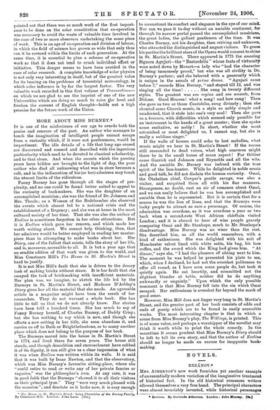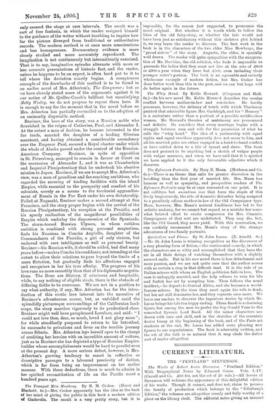MRs. ATHERTON'S new work furnishes yet another example of an
essentially modern variation of the imaginative treatment of historical fact. In the old historical romances writers allowed themselves a very free hand. The principal characters were almost invariably invented, while historical personages • Beadily% By Gertrude Atherton. London : John Murray. CeL3 only crossed the stage at rare intervals. The result was a sort of free fantasia, in which the reader resigned himself to the guidance of the writer without troubling to inquire how far the picture diverged from traditional or authoritative records. The modern method is at once more conscientious and less homogeneous. Documentary evidence is more closely studied and more accurately reproduced. The imagination is not continuously but intermittently exercised. That is to say, imaginative episodes alternate with more or less accurate presentations of historic fact, and the reader, unless he happens to be an expert, is often hard put to it to tell where the deviation exactly begins. A conspicuous example of the drawbacks of this method is to be found in an earlier novel of Mrs. Atherton's, The Conqueror ; but as we have already stated some of the arguments against it in our notice of Mr. Quiller-Couch's brilliant but unsatisfying Hefty Wesley, we do not propose to repeat them here. It is enough to say for the moment that in the novel before us Mrs. Atherton has partially reconciled us to the adoption of an eminently disputable method.
Reztinov, the hero of the story, was a Russian noble who flourished in the reigns of Catherine, Paul, and Alexander I. At the outset a man of fashion, he became interested in the fur trade, married the daughter of a leading Siberian merchant, and having obtained a considerable ascendency over the Emperor Paul, secured a Royal charter under which the whole of Alaska passed under the control of the Russian. American Company. Rezo.nov, in spite of opposition in St. Petersburg, managed to remain in favour at Court on the succession of Alexander I., and it was as Chamberlain and Imperial Plenipotentiary that he undertook his abortive mission to Japan. Reztinov, if we are to accept Mrs. Atherton's view, was a man of grandiose and far-reaching ambitions, who regarded the securing of trading facilities with the island Empire, while essential to the prosperity and comfort of his colonists, merely as a means to the territorial aggrandise- ment of Russia in the Far East under his own dictatorship. Foiled at Nagasaki, Reztinov makes a second attempt at San Francisco, and the story proper begins with the arrival of the Russian Plenipotentiary, his reception at the Presidio, and his speedy realisation of the magnificent possibilities of Empire which underlay the dispossession of the Spaniards. The storm-tossed Russian Ulysses, in whom ruthless ambition is combined with strong personal magnetism, finds his Nausicaa in Concha Arguello, daughter of the Commandante of the Presidio, a girl of only sixteen, but endowed with rare intelligence as well as personal beauty. Rezinov—bis Russian wife, it should be added, had died many years before—makes Concha his confidante, not intending at the outset to allow their relations to pass beyond the limits of a mere flirtation, but gradually finds his affections engaged and recognises in her his true affinity. The progress of his love runs no more smoothly than that of his diplomatic negotia- tions. The Dons are dilatory, if courteous and hospitable, while, to say nothing of eligible rivals, there is the obstacle of differing faiths to be overcome. We are not in a position to say what authority, if any, Mrs. Atherton has for the intro- duction of this exotic love interest into the narrative of Rezinov's adventurous career, but, as unfolded amid the splendidly picturesque surroundings of the Californian land- scape, the story marches vigorously to its predestined close. Rezinov might well have paraphrased Lovelace, and said : "I could not love thee, dear, so much, loved I not glory more "; for while steadfastly purposed to return to his betrothed, he succumbs to privations and fever on the terrible journey across Siberia. Mrs. Atherton lays herself open to the charge of crediting her heroine with an incredible amount of culture, just as in Reztinov she has depicted a type of Russian Empire- builder whose accomplishments would be hard to parallel even at the present day. A more serious defect, however, is Mrs. Atherton's growing tendency to resort in reflective or descriptive passages to a laboured preciosity of diction, which is far from being an improvement on her earlier manner. With these deductions, there is much to admire in her spirited reconstitution of life on the Pacific coast a hundred years ago.















































 Previous page
Previous page